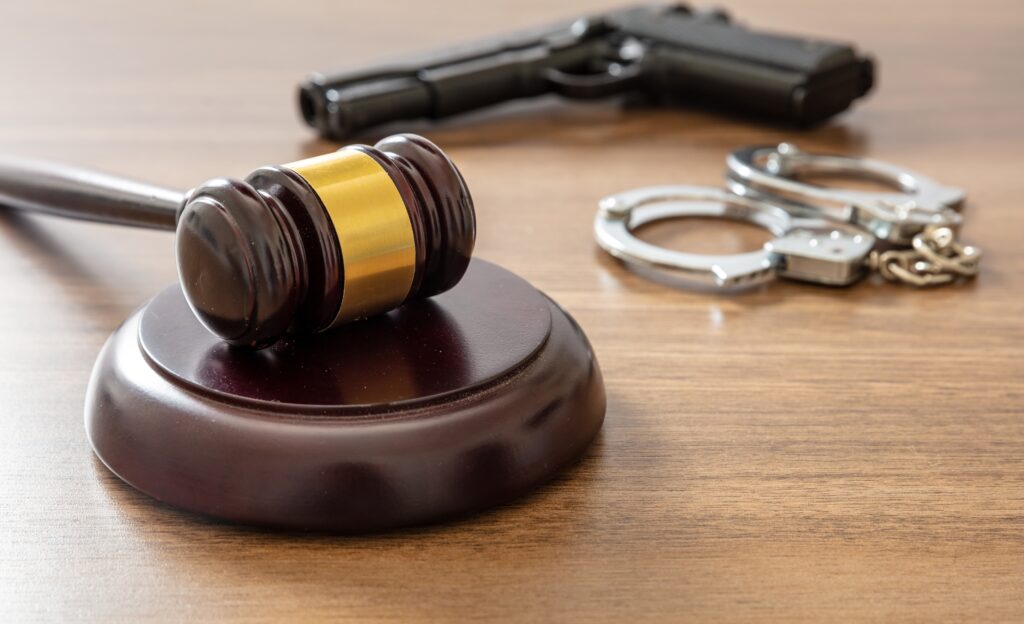Facing a weapons charge in Indianapolis can be intimidating, with consequences ranging from steep fines and imprisonment to losing gun rights or struggling to find employment. If you're navigating this challenging situation, having a knowledgeable and dedicated legal team on your side is crucial. At Hayes Law Office, we’re here to provide the experienced representation and support you need to protect your future.
What Are Weapons Offenses?
Indiana’s weapons laws encompass a wide range of charges and circumstances. These laws regulate the possession, transfer, and use of firearms, knives, and other weapons.
Common weapons offenses include:
- Carrying a handgun without a license
- Possessing a firearm as a serious violent felon
- Unlawful sale or transfer of a firearm
- Possession of a firearm following a domestic battery conviction
- Pointing a firearm at another individual
- Owning or possessing a firearm with an obliterated serial number
Additionally, Indiana law outlines licensing requirements for both open and concealed carry. Strict prohibitions exist for individuals with prior felony or domestic battery convictions, making compliance with these laws essential.
Why You Need an Indianapolis Weapon Offenses Lawyer
Weapons charges are legally complex and often influenced by both state and federal regulations. Missteps in handling your case could lead to severe repercussions. An experienced weapon offenses lawyer can make all the difference in your defense by:
- Conducting a thorough examination of your case
- Identifying and challenging improperly obtained evidence
- Negotiating with prosecutors to reduce or dismiss charges
- Providing assertive representation in court
At Hayes Law Office, we bring a detailed understanding of weapons-related legal issues to every case, working tirelessly to pursue the best outcome for our clients.
Common Types of Weapons Crimes Handled
Our legal practice is dedicated to defending individuals against a diverse range of weapons charges, recognizing that each case presents unique challenges and demands a tailored defense strategy.
Prohibited Weapons
Indiana law restricts possession of certain weapons, including:
- Sawed-off shotguns
- Machine guns
- Armor-piercing ammunition
- Throwing stars (throwing knives with angled blades)
While switchblades are no longer banned, possessing or using such weapons can still lead to charges under specific circumstances.
Knife Crimes in Indiana
While Indiana has eased some of its general knife regulations, it's crucial to understand that significant restrictions still apply in specific contexts. Carrying knives in sensitive locations such as government buildings, schools, or on public transportation remains strictly prohibited.
The use of automatic knives during any criminal activity is met with severe penalties. It's also important to note that employing a knife during the commission of any crime will almost certainly lead to more severe legal consequences than the crime itself might otherwise carry.
Gun Crimes and Firearm Charges
In Indiana, firearm offenses cover a broad range of illegal activities, ranging from relatively minor violations to extremely serious felonies, each carrying significant legal repercussions. For example, the act of pointing a gun at another individual, even without malicious intent, is considered a serious offense due to the inherent danger and intimidation it presents.
Beyond brandishing a weapon, other regulations include the requirement for individuals to possess a valid license when carrying a handgun. The state takes a strict stance against convicted felons, who are strictly prohibited from possessing any firearm. These gun laws collectively underscore Indiana's commitment to public safety and its efforts to regulate firearm ownership and use responsibly.
Stun Gun Laws in Indiana
In Indiana, stun guns are generally legal for individuals aged 18 and over to carry, reflecting the state's stance on personal self-defense tools. However, this legality comes with a significant emphasis on responsible usage.
While stun guns can be a valuable non-lethal option for protection, their deployment must strictly adhere to self-defense scenarios. Misusing a stun gun in an aggressive manner or outside the bounds of legitimate self-defense can lead to serious legal consequences, with potential charges ranging from misdemeanors to felonies, depending on the severity of the misuse and the harm inflicted.
Potential Penalties for Weapons Offenses
The penalties for weapons offenses in Indiana are varied and directly tied to the specific nature of the crime, often ranging from misdemeanors to serious felonies with significant prison sentences and hefty fines. Understanding these potential consequences is crucial, as even seemingly minor violations can lead to substantial legal ramifications.
Penalties may include:
- Prohibited Weapons Offenses: Possessing a sawed-off shotgun, machine gun, or armor-piercing ammo can result in severe felony charges. A felony conviction like this can lead to 1-6 years in prison and significant fines.
- Knife Offenses: Using a knife during the commission of a felony is often considered an aggravating factor which can lead to increased penalties. Knives used during an assault can also escalate charges from simple assault to aggravated assault. These charges can result in jail time and significant fines.
- Gun & Firearm Offenses: Penalties for firearm offenses vary drastically across Indiana. For example, unlawful possession of a firearm by a felon can result in 2-12 years in prison. But acts like pointing a gun at another individual can also lead to serious felony charges that carry a sentence of 6 months to 2.5 years in prison. Carrying a handgun without a required license is often a misdemeanor offense but can still result in up to one year in jail.
- Stun Gun Offenses: Stun guns are legally allowed in Indiana, strictly for self-defense purposes. Misusing a stun gun can result in misdemeanor or felony charges based on the extent of harm caused or the nature of the aggressive act. This can lead to jail time and fines.
Given the serious and varied outcomes for weapons offenses, working with a qualified criminal defense attorney is critical when facing such charges to navigate the legal process effectively and mitigate potential penalties.
How The Hayes Law Office Can Help You
At Hayes Law Office, we’re committed to building robust legal defenses tailored to each client's situation. While every case is unique, we employ strategies such as:
- Challenging evidence gathered through illegal searches or seizures.
- Demonstrating lawful possession of the weapon.
- Identifying errors or inconsistencies in the prosecution’s case.
- Negotiating plea bargains to reduce penalties when appropriate.
Our meticulous approach ensures we leave no stone unturned in the defense of your rights.
Contact an Indianapolis Weapon Offenses Lawyer Today
A weapons charge doesn't just threaten your freedom; it threatens your entire future. Don't let a moment of accusation define the rest of your life. When you partner with Hayes Law Office, you're not just hiring a lawyer—you're gaining a dedicated advocate, unparalleled guidance, and the aggressive experience needed to rigorously safeguard your rights and livelihood.
Your future is on the line. Contact our office today for an immediate, confidential consultation. Together, we will meticulously craft a powerful defense strategy designed to protect what matters most: your future, your reputation, and your peace of mind. Call us now to take the critical first step towards reclaiming your life.
Frequently Asked Questions About Weapon Offenses
Can I Carry a Knife or Gun Legally in Indianapolis?
Yes, but restrictions apply. You must follow the state’s licensing requirements for firearms and avoid carrying weapons into prohibited locations. For knives, certain types and uses remain regulated.
What Should I Do if Arrested for a Weapon Offense?
If you’ve been arrested, remain calm and do not resist. Contact a lawyer immediately and avoid making any statements to law enforcement without legal counsel.
How Long Does a Weapons Conviction Stay on My Record?
The length of time depends on the nature of the conviction. Certain felony charges may remain on your record permanently, while others might be eligible for expungement after a prescribed period.



